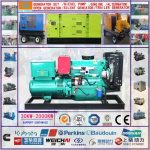Introduction
Salt spray testing is a crucial process in determining the corrosion resistance of materials and coatings. It involves subjecting test samples to a saline environment to simulate the corrosive effects of saltwater exposure. One of the key components necessary for conducting salt spray testing is a reliable power source, such as a diesel generator. In this article, we will explore the importance of diesel generators for salt spray testing, their key features, and considerations for selecting the right generator for this specific application.
Importance of Diesel Generators for Salt Spray Testing
Salt spray testing requires a continuous and reliable source of power to ensure that the testing environment is maintained at the desired conditions. Diesel generators are well-suited for this purpose due to their robustness, reliability, and ability to provide consistent power output over extended periods. The ability of diesel generators to operate for long durations without interruptions makes them an ideal choice for salt spray testing, which often requires testing samples for days or even weeks.
Key Features of Diesel Generators for Salt Spray Testing
1. Robust Construction: Diesel generators are designed to withstand harsh operating conditions, making them suitable for use in salt spray testing environments. Their rugged construction ensures durability and longevity, even when subjected to corrosive atmospheres.
2. High Power Output: Diesel generators are capable of delivering high power output, making them suitable for powering the various components of a salt spray testing chamber, such as pumps, heaters, and fans. The consistent power output of diesel generators ensures that the testing conditions remain stable throughout the testing process.
3. Fuel Efficiency: Diesel generators are known for their fuel efficiency, making them a cost-effective option for salt spray testing applications. 600kw diesel generator for remote environmental projects of diesel fuel allows diesel generators to operate for extended periods without the need for frequent refueling.
4. Low Maintenance Requirements: Diesel generators require minimal maintenance compared to other types of power sources, making them a convenient choice for salt spray testing facilities. Regular servicing and maintenance can help ensure the optimal performance and longevity of diesel generators in salt spray testing applications.
Considerations for Selecting a Diesel Generator for Salt Spray Testing
When choosing a diesel generator for salt spray testing, several factors should be taken into consideration to ensure optimal performance and reliability. Some key considerations include:
1. Power Output: The power output of the diesel generator should be sufficient to meet the requirements of the salt spray testing chamber and its components. It is essential to calculate the total power consumption of the testing setup to determine the appropriate power rating of the generator.

2. Fuel Efficiency: Selecting a fuel-efficient diesel generator can help reduce operating costs and minimize the environmental impact of salt spray testing activities. Consider generators with advanced fuel injection systems and energy-saving features to maximize fuel efficiency.
3. Environmental Compliance: Salt spray testing facilities must adhere to environmental regulations and standards regarding emissions and pollution control. Choose a diesel generator that meets the necessary emission requirements and is certified for use in salt spray testing applications.
4. Reliability and Durability: The reliability and durability of the diesel generator are crucial factors to consider, especially in salt spray testing environments where corrosive atmospheres can impact equipment performance. Look for generators from reputable manufacturers known for producing high-quality and durable products.
5. Noise Level: Salt spray testing facilities often require a quiet testing environment to minimize interference with the testing process. Select a diesel generator with low noise levels to ensure a conducive working environment for testing personnel.
6. Maintenance Requirements: Consider the maintenance requirements of the diesel generator, including servicing intervals, spare parts availability, and technical support. Opt for a generator that is easy to maintain and has a reliable service network to ensure minimal downtime during testing activities.
Conclusion
Diesel generators play a critical role in providing the necessary power supply for salt spray testing, ensuring that testing conditions are maintained at optimal levels throughout the testing process. Their robust construction, high power output, fuel efficiency, and low maintenance requirements make them an ideal choice for salt spray testing applications. By considering key factors such as power output, fuel efficiency, environmental compliance, reliability, noise level, and maintenance requirements, salt spray testing facilities can select the right diesel generator to meet their specific testing needs. Investing in a high-quality diesel generator for salt spray testing can help enhance testing efficiency, accuracy, and reliability, ultimately leading to improved product quality and performance in corrosive environments.
